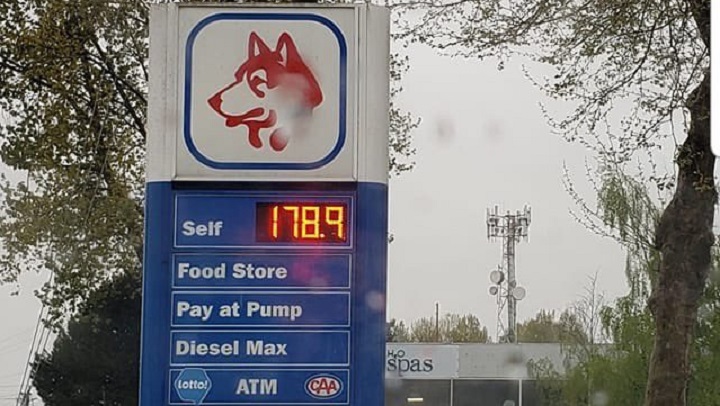A Vancouver-based economist says the oil industry is “gouging” Vancouver consumers and is calling on the province to regulate the price of gasoline.

Marc Lee, a senior economist with the Canadian Centre for Policy Alternatives (CCPA), a left-leaning think tank, made the call Monday, and the group has launched a campaign to try and build public support behind the idea.
WATCH: Rising gas prices — Is there a solution?

Lee says of the 55-cent increase in Metro Vancouver gas prices since 2016, only 6.3 cents came from tax hikes. Lee says in that same time, the four companies that supply Vancouver have hiked their margins three times that amount by a total of 18 cents.
He says Vancouver refining margins currently represent 55 cents of the price of gas, compared to between 18 and 32 cents per litre in Toronto or Calgary.
“In B.C., we already regulate energy prices of electricity through B.C. Hydro and natural gas prices so it’s a natural fit given how important transportation fuels are to the economy that this also be brought under the mandate of the B.C. Utilities Commission,” he said.
“It’s also the case that other provinces that have dealt with unfair pricing and lack of competition in their market prices have regulated a maximum price for gasoline.”
Maritime model
Canada’s Maritime provinces, along with Quebec, all use some form of price regulation, with several including maximum price caps.
In Nova Scotia, for example, those prices are set weekly by looking at the wholesale spot prices at the New York Harbour market as a base, then adding a “reasonable” wholesale and retail margin, taxes and allowances for transportation on top, explains Rod Hill, professor of economics at the University of New Brunswick.
READ MORE: ‘The new normal’ — Metro Vancouver record-high gas prices here to stay, analyst says

Get daily National news
Hill said if the public is hoping regulation could be the silver bullet that suddenly brings prices down, they’ll be disappointed. He said regulation works well to keep prices predictable but does not function to automatically keep prices low.
WATCH: Liberal MLA says government should have acted on gas prices ‘a year ago’

But he said the system comes with a different kind of benefit.
“It doesn’t provide low prices but it does provide some transparency,” he said.
“Anyone who is interested can find out why the price changed, and if there is a large price change, it’s really only coming about because the fundamental underlying market on which it’s based has moved for some reason.”
Gouging or tight supply?
Gasbuddy.com petroleum analyst Dan McTeague says a regulated market would serve to “cement” high prices in place, with most gas stations keeping to the maximum until it is reset the following week.
He added that if regulated prices were too low, they could also result in shortages.
“It’s a system that fundamentally doesn’t work. It’s not necessary and it certainly doesn’t reflect what market forces would bring,” he said.
WATCH: Surrey gas thief caught on camera

McTeague argued that the real driver of prices in Vancouver is a lack of fuel supply and players in the market. He said the lack of supply forces wholesalers to compete for gasoline with other jurisdictions, paying a higher price per barrel to make up the shortfall.
READ MORE: Gas in Vancouver hovers above $1.70 a litre — Is this what the rest of Canada is in for?
“When you have a shortage in a given market and you are always looking at external suppliers to backfill or supplement the shortfall then no amount of intervention is going to prevent that,” he said.
“It’s the cost of not having enough, putting all of our eggs in one basket by relying on one pipeline and one very small refinery.”
But Lee questions if there really is a shortage or whether the region’s too few suppliers are taking advantage of a lack of competition to rake in windfall margins.
About two-thirds of the region’s gas comes from a handful of refineries in Alberta, with about 10 per cent coming from Washington state and the remainder made up by Burnaby’s Parkland refinery.
Lee cited a 2018 study by energy and environment think tank Navius Research, which found that refining margins for the Vancouver area have “decoupled from supply costs, resulting in high prices that cannot be attributed to competitive market forces or scarcity of supply” in recent years.
“Since 2015, wholesale prices have increased well above supply cost, driving an increase in the average refining margin within the Vancouver-area fuel market that cannot be attributed to competitive market forces or scarcity of supply,” according to the study.
WATCH: John Horgan thinks gas prices should be federal election issue

READ MORE: Metro Vancouver gas is so expensive, someone drilled it out of this man’s tank
Lee said Vancouver gasoline demand has only climbed about eight per cent in the last decade, and if there truly is a shortage of supply then regulators would serve to make that clear to consumers.
“The problem in an uncompetitive market with the market charging what the market will bear is we get this kind of gouging behaviour,” he said.
“I would say let’s have an investigation. There’s a lot we don’t know. The industry is very opaque so part of the regulatory ask should be to make the industry more accountable and transparent about its operations.”
However, the CCPA campaign may face an uphill battle, with B.C. Premier John Horgan ruling regulation out last week.
“I don’t believe the Maritimes are having any more success than we are having here with pure regulation,” Horgan said.
“I believe it’s a supply problem, and we don’t have enough refined product for the travelling public.”









Comments